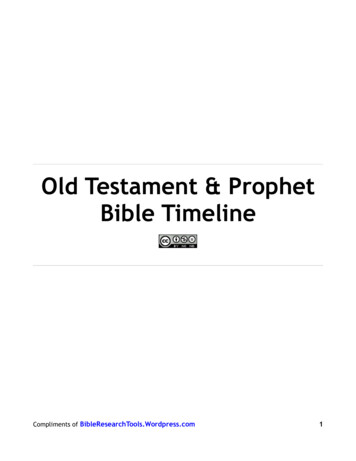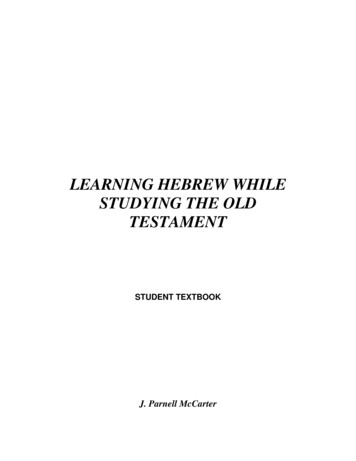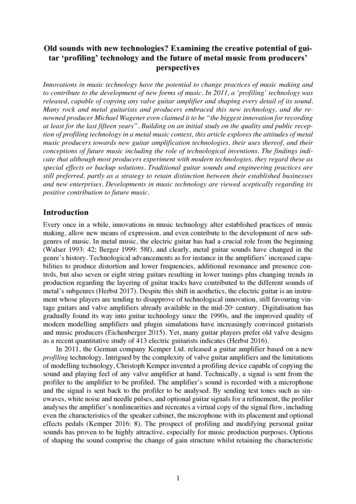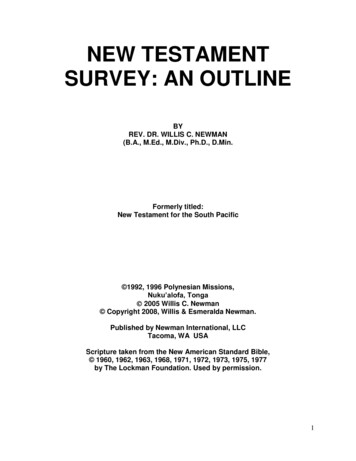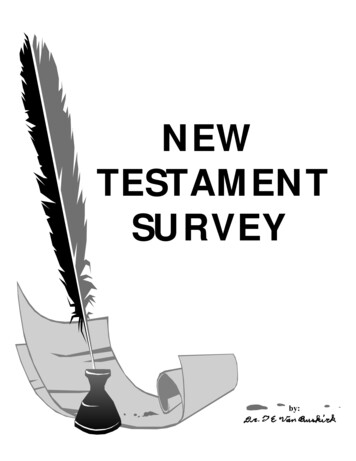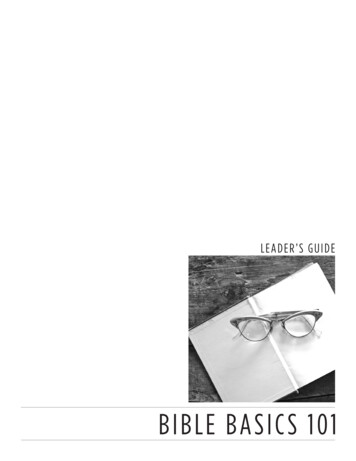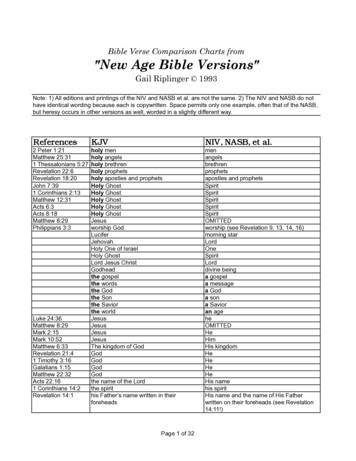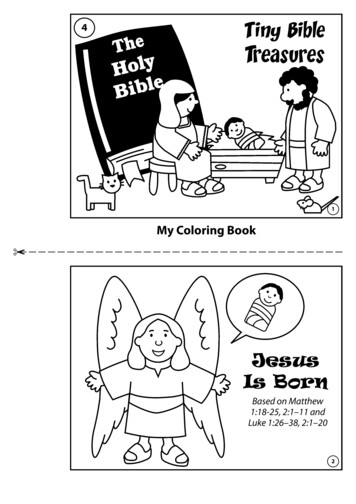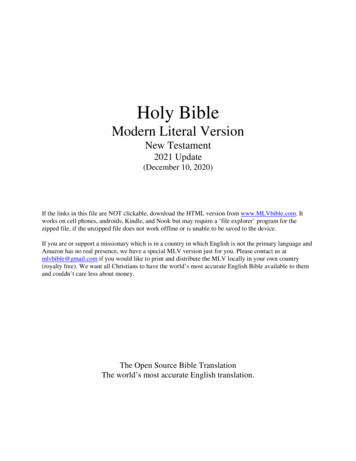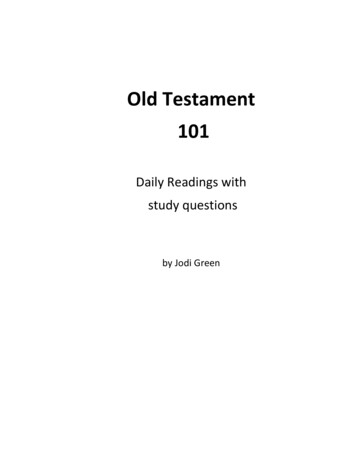
Transcription
Old Testament101Daily Readings withstudy questionsby Jodi Green
Copyright 2016By Jodi GreenAll scripture quotations are from the New King Jamesversion.2
Special ThanksA special thank you toKarissa Sherwinwho journeyed with methrough each lessonfor two years,offering comments and suggestionsalong the way.You are a great blessing, Karissa!Also, special thanks to my brother,Jay PettitFor his wonderful adviceand support throughoutthis projectand my entire life.I love you!3
4
How to Use This BookOld Testament 101 is a guide to studying the Old Testament inchronological order by reading one chapter per day, five daysper week. This study is suitable for all ages, from middle schoolthrough adults.There is great benefit in studying the Bible in an orderly way, asopposed to a random passage each day or even a needs-basedstudy (for example, helping you through a particularly difficultsituation). If you learn to study the Bible in a sequential way, youwill eventually find what God's Word says about everyconceivable human situation.In this study you will have five days of readings each week,reading usually one chapter per day. This leaves the weekendsto catch up on anything that was missed during the week. Thisstudy is a comprehensive overview in which some books haverepresentative chapters chosen for continuity, while others willbe studied in their entirety. In other words, not every chapter ofthe Old Testament is included for specific study, but I wouldencourage you to read all of them if you can. In the cases ofevents repeated in different books, usually only one account isstudied.Each lesson begins with an overview of the week's readings.Sometimes there are questions to consider in the overview thatwill help your general understanding of the lesson for that week.You may skip the overview, but it can be very beneficial to yourunderstanding of the chapters for the week.The questions are very straightforward and are designed to beanswered in the simplest way. The primary goal is anunderstanding of God’s Word rather than a specific applicationto your particular circumstances. Practice letting the Holy Spiritapply your day's reading as you meditate throughout the day onwhat His Word says.On the "For Further Study" pages, there is a selected keyverse(s) to think about, and blank lines in which you may write aprayer, other passages that stand out to you, or some otheraspect of the study that you may want to remember.5
If you are confused by any of the passages that you read, thereare many available resources for answering your questions. Iwould encourage everyone who wants to study the Bible to finda Bible-believing church and become involved. The Holy Spirit isyour best resource for understanding God’s Word, but it is vitalthat your church leaders help you as well. There are manyonline helps, such as biblos.com and others listed in the “StudyHelps” section in the back. Finding a mentor to help you canalso be of great benefit.May God bless you as you seek to know Him more through thestudy of His Word.In Christ,Jodi Green“For the Word of God is living and powerful, and sharper thanany two-edged sword, piercing even to the division of soul andspirit, and of joints and marrow, and is a discerner of thethoughts and intents of the heart.” (Hebrews 4:12)6
Lesson 1OverviewWhat a person believes about Genesis forms the basis for whathe or she believes about everything. For example: do you reallybelieve the Biblical account of creation, the entrance of sin andthe flood? Do you really believe Abraham’s family is God’schosen people? As you read and study Genesis, you will havethe opportunity to think about what you really believe aboutthe Bible. Will you be among the majority and decide that onlyparts of the Bible are true? Will you pick out for yourself whichparts are true and which parts are not? Will you trust modernscientists and social engineers over God’s Word? Is the Biblereally God’s Word? Is it true? Or does science prove the Genesisaccount is incorrect?As you think about these questions, it would be of great benefitto spend some time in research about the claims of modernscience concerning the origin of the universe and evolution.Some helpful places to begin are: www.answersingenesis.org;www.icr.org; www.creationtoday.org.So now, it’s time to dig in to the first 5 chapters. These chaptersmake up so much of the basis of what to believe about the restof the Bible that it will be helpful to spend at least two weeksreading and studying them. Get in the habit of reading slowlyand carefully. Think through exactly what God is telling you ineach verse. There is so much controversy, even amongChristians, over these beginnings. Answer the questionsthoughtfully. Chapter 1 gives the creation overview, whilechapter 2 fills in some greater detail. Chapter 3 shows thebeginning of sin. If there are notes in your Bible, form the habitof cross-referencing. For example, Genesis does not give us theorigin of the devil, but Ezekiel 28:11-19 explains a lot of what weknow about him.7
Lesson 1Daily Bible StudyDay 1: Read Genesis 1How and when did God create light? (v. 1-5)What did God make on the second and third days? (v. 6-13)What did God make on the fourth and fifth days? (v. 14-23)What did God make on the sixth day? (v. 24-31)Beginning in verse 11, count the number of times the phrase,“according to its kind” (or the equivalent in your translation) isrepeated: What does this phrase mean?Day 2: Read Genesis 2What did God do on the seventh day, and how did He describeit? (v. 1-3)How did man receive life? (v. 4-7)Where exactly was the garden? (v. 8-14)What restrictions and warnings did God give? (v. 15-17)How did God make the first woman and why? (v. 18-25)Day 3: Read Genesis 38
What were the serpent’s first words to the woman? (v. 1)How did she change God’s words? (v. 2-3)Why did she eat the fruit? (v. 4-6)Why did they hide? (v. 7-13)What were the results? (v. 14-19)How did God clothe them and why? (v. 20-24)Day 4: Read Genesis 4What was the difference in the offerings? (v. 1-5)How did Cain respond? (v. 6-10)What was the result? (v. 11-16)Describe Cain’s life and family. (v. 17-24)How was Seth’s family different from Cain’s? (v. 25-26)Day 5: Read Genesis 5Why do you think these birth and death records are so precise?(v. 1-20)What happened with Enoch and why? (v. 21-24)What was the relationship of Methuselah and Noah? (v. 25-32)9
For Further StudyKey Verse: “In the beginning God created the heavens and theearth.”Genesis 1:1(This page is designed for you to write anything else that stoodout to you in your Bible study or questions you may have. Also,writing out memory work is helpful. You may also use this spacefor sermon notes.)10
Lesson 2OverviewThe story of Noah and the ark is one of the most popular storiesin the entire Bible. In fact, almost every culture on our planethas a great flood story in its history, even the ones who do notknow the Bible. So, are we meant to believe this story is real?That it actually happened? Is there anything at all to suggestthat the story is a parable or an allegory? How do we know ifthese people are real or imaginary? As you read and study theBible, form the habit of letting the Bible explain itself to you. Forexample, to determine whether a story is real or a parable, findan example that you know is a parable, and see how it isintroduced. Look up the Good Samaritan story (Luke 10:30-37).Does it seem to be told as a historical fact or as a parable?It should be clear that the Bible presents the account of theflood as a factual part of history. If you spend some time on thewebsites mentioned in Lesson 1, you will find a great amount ofscientific evidence that shows the truth of this account.There are parts to this story that hold mystery for us. Forexample, in chapter 6, who exactly were the sons of God andthe daughters of men? Why were their children giants? Somescholars believe that the contrast was between Seth’sdescendants, who loved God, and Cain’s descendants, who didnot love God. The Bible doesn’t tell us the answer. But we mustdevelop the habit of trusting God to reveal to us what we needto know to understand His message of salvation to us. If there issomething confusing, simply trust Him to show you what youneed to know at the proper time. Just be sure you are getting allyour facts from God’s Word.These chapters are also a good place to spend a couple of weeksreading and rereading in order to gain a deeper understanding.11
Lesson 2Daily Bible StudyDay 1: Read Genesis 6What specifically grieved the Lord? (v. 1-6)What specific sins are mentioned? (v. 7-12)What shape was the ark? (v. 13-17)What did Noah do? (v. 18-22)Day 2: Read Genesis 7How many of each kind of animal did Noah take? (v. 1-3)Describe where the flood waters came from. (v. 4-11)How high did the flood waters rise? (v. 12-20)How long did it rain (v. 17), and by verse 24 how long had theybeen in the ark? (v. 21-24)Day 3: Read Genesis 8How long had they been in the ark when the tops of themountains became visible? (v. 1-5)How did Noah know the waters had receded? (v. 6-11)12
How did Noah know when to leave the ark? (v. 12-19)Compare 8:14 to 7:11. How long were they in the ark total?What promise did God make? (v. 20-22)Day 4: Read Genesis 9What do these verses imply about their eating habits? (v. 1-3)Why did God institute capital punishment? (v. 4-6)What is the significance of the rainbow? (v. 7-17)Why was Ham cursed while Shem and Japheth were blessed? (v.18-29)Day 5: Read Genesis 10Who is referred to in these verses and how are they described?(v. 1-5)Name several famous cities associated with Ham’s family. (v. 620)Are any sons of Shem familiar to you? (v. 21-32)13
For Further StudyKey Verse: “But Noah found grace in the eyes of the Lord.”Genesis 6:814
Lesson 3OverviewThis week’s reading begins with the famous story of the towerof Babel. In chapter 10 we read about the descendants of Noahand where they settled in ancient Mesopotamia. Verses 5, 20and 31 mention the different languages. Chapter 11 goes backand fills in details about how the different languages came to be(similar to Genesis 2 which fills in details about chapter 1).Something to think about: who was writing this history of theworld? The first five books of the Old Testament are known asthe Pentateuch and are attributed to Moses in several places inthe Bible. Of course we think about 2 Timothy 3:16, “Allscripture is given by inspiration of God ”, but we also knowthat God chose human writers to pen the words He gave them(1 Peter 1:19-21). Genesis 5 and 10 begin with, “Now this is thegenealogy of ” and that phrase appears twice in chapter 11. Sodid God supernaturally give Moses all the names and dates inGenesis? Or did Adam and Noah keep careful records that werepreserved for those generations? Do you think Adam had awritten language? Or do you picture Adam as a cavemandrawing stick figures on cave walls? Though cavemen are notspecifically mentioned in the Bible, it seems safe to assume thatAdam and his sons were not cavemen. The most plausible placefor cavemen in the Bible is here in chapter 11 when Godconfused their language, and they were forced to spread out asGod had already told them to do.Chapter 12 begins the account of God’s covenant with Abrahamand His own chosen people. Consider carefully the promisesmade to Abraham, especially in light of the on-going strife inthat land to this very day. The sons of Abraham are still fightingover this all these many years later. We will see the beginning ofthe controversy as we study this section.15
Lesson 3Daily Bible StudyDay 1: Read Genesis 11What were they building and why? (v. 1-4)What was God’s response? (v. 5-9)How old was Shem during the flood? (v. 11-27)What is interesting about Terah? (v. 27-32)Day 2: Read Genesis 12What stands out to you about God’s promises to Abram? (v. 13)What do you think verse 3 means?Where did Abram go, and what did God say about it? (v. 4-7)Where exactly did Abram build this altar? (v. 8-9 – this place willbe interesting in later study)Why did Abram lie, and how did God protect Sarai? (v. 10-20)Day 3: Read Genesis 1316
What was Abram’s financial situation? (v. 1-2)Why did Abram and Lot separate from each other? (v. 3-13)What did God promise Abram, and what did Abram do? (v. 1418)Day 4: Read Genesis 14What did Abram do for Lot and why? (v. 1-17)Who was Melchizedek and how did Abram respond to him? (v.18-20)Why did Abram refuse gifts from the king of Sodom? (v. 21-24)Day 5: Read Genesis 15What was Abram concerned about? (v. 1-3)What did God promise and what was Abram's response? (v. 4-6)What did Abram ask for and what did God ask him to do? (v. 710)Describe what you understand of this prophecy. (v. 11-21)17
For Further StudyKey Verse: “And he believed in the Lord, and He accounted it tohim for righteousness.”Genesis 15:618
Lesson 4OverviewThese chapters have some very difficult situations to process.One outstanding thought for every believer should be that evenwhen we make mistakes, God is still gracious and still in controlof everything.Keep in mind that Abram and Sarai were their original names,but God renamed both of them to the more familiar Abrahamand Sarah. Both sets of names had meanings, which were veryimportant to the people of that day. Names had to do withcharacter and purpose, and in some cases even reputation.Spend some time with the more difficult chapters trying toimagine how the people of that day dealt with their culture.Some issues, like marrying more than one wife, were commonamong pagan cultures, but that practice was definitely notGod’s will. It was very easy even for people of God to get mixedup with ungodly ideas and turn from God’s will for their lives. Itwas a big temptation for them, and it still is a big temptationtoday. That is one of the compelling reasons to read God’s Wordcarefully and thoughtfully. If we stay close to God’s Word, wewill be less inclined to get caught up in the culture of our daythat draws our hearts and lives away from God. We read in thislesson how both Abraham and Lot got caught up in ungodliness,and we see the disastrous consequences.Several times during the life of Abraham, God confirmed Hiscovenant with Abraham and his descendants. Abraham’s familybecame the chosen people of God. It would be throughAbraham’s line that God’s Messiah would come. You will seethrough the entire Old Testament how God protected andprovided for the lineage of our Savior.19
Lesson 4Daily Bible StudyDay 1: Read Genesis 16Why did Abram marry Hagar? (v. 1-3)Why was Sarai upset? (v. 4-5)What happened to Hagar? (v. 6-9)How did the Angel of the Lord encourage Hagar? (v. 10-16)Day 2: Read Genesis 17How was Abraham’s name change tied to God’s covenant withhim? (v. 1-5)Name some other parts of the covenant (v. 6-9)How was circumcision part of the covenant? (v. 10-14)Why did Abraham laugh? (v. 15-17)What would become of Ishmael? (v. 18-27)Day 3: Read Genesis 18What did Abraham think of his guests? (v. 1-5)What did Abraham do for them? (v. 6-8)20
Why did Sarah laugh and why did she lie about it? (v. 9-15)What was wrong with Sodom and Gomorrah? (v. 16-21)What did Abraham ask for and why? (v. 22-33)Day 4: Read Genesis 19Why did Lot want the angels to stay with him? (v. 1-5)What awful thing was Lot willing to do and what was the result?(v. 6-11)What was the main problem with Lot’s family? (v. 12-16)What happened? (v. 17-29)Why did Lot’s daughters do this terrible deed? (v. 30-38)Day 5: Read Genesis 20Why did Abraham lie? (v. 1-2)How did Abimelech know the truth? (v. 3-7)How did Abraham justify his lie? (v. 8-13)What was the result? (v. 14-18)21
For Further StudyKey Verse: “Then she called the name of the Lord who spoke toher, You-Are-the-God-Who-Sees; for she said, ‘Have I also hereseen Him who sees me?’ “Genesis 16:1322
Lesson 5OverviewThe story of Abraham is not only the history of the chosenpeople of God, but it is also full of lessons for our own Christianlives. Abraham and Sarah were incredibly blessed by God, butthey were by no means perfect. God in His wisdom recorded thegood and the bad so that we might see His grace, mercy andsovereignty.This is a good time to be sure that your beliefs about thesepeople and events line up with what the Bible says. It is amazinghow many people see movies or books that depict someone’sideas about Bible stories, and then have trouble rememberingwhich facts were actually in the Bible. Pay careful attention toyour reading so that you do not get someone else’s imaginationconfused with the inspired Word of God.These chapters tell the remarkable story of the birth of Isaac toAbraham and Sarah in their old age. We see the conflictbetween Ishmael and Isaac, which still rages on to this day. Agreat lesson to us is that we must never violate God’s will inorder to help God accomplish His purpose. We are honoredwhen God uses us to further His kingdom, but we must alwaysfollow His will. Abraham and Sarah knew they had a promisefrom God about a son, but they were too impatient to wait forGod’s timing. And then when God did send them a son, theconflict between God’s ways and man’s ways proved too muchfor them to live with.Ishmael’s descendants and Isaac’s descendants have been atwar almost ever since this first account. We must rememberthat the son of God’s promise was Isaac, and the land of Israelbelongs to Isaac’s descendants. We will be studying the landand God’s people for many months to come as we read thisamazing account of God’s covenant with Abraham.23
Lesson 5Daily Bible StudyDay 1: Read Genesis 21What was Sarah’s son’s name? (v. 1-3)What did Sarah learn in her laughter? (v. 4-7)Why was Sarah upset and what was the result? (v. 8-13)What happened to Hagar and Ishmael? (v. 14-21)What was Abraham’s name for God at Beersheba? (v. 22-34)Day 2: Read Genesis 22What did God tell Abraham to do, and what was his response?(v. 1-3)How is Abraham’s faith shown? (v. 4-8)Considering Abraham’s age, how is Isaac’s faith shown? (v. 9-10)Why did God say He would bless the nations through Abraham?(v. 11-24)Day 3: Read Genesis 23Did Abraham and the Canaanites consider the land to belong toAbraham? (v. 1-9)What was the relationship between Abraham and theCanaanites? (v. 1-9, again)24
Why did Abraham want to pay for the land? (v. 10-16)Where was Sarah buried? (v. 17-20)Day 4 – Read Genesis 24What did Abraham want his servant to do? (v. 1-4)What was the servant’s concern and Abraham’s response? (v. 59)What was the servant’s prayer and the result? (v. 10-21)Do you know why the servant was so deeply grateful? (v. 22-27)After the servant told the whole story, what was the responsefrom Rebekah’s brother and father? (v. 28-51)What did the servant want to do and what was Rebekah’sresponse? (v. 52-61)How did Isaac feel about Rebekah? (v. 62-67)Day 5 – Read Genesis 25Write anything that stands out to you about Abraham’s deathand burial. (v. 1-18)What happened with Esau’s birthright? (v. 19-34)25
For Further StudyKey Verse: “And Abraham called the name of the place, TheLord-Will-Provide; as it is said to this day, ‘In the Mount of theLord it shall be provided.’ “Genesis 22:1426
Lesson 6OverviewWe will take a break from Genesis and spend some time in thebook of Job. It will seem like we are skipping over to Job, and ina sense we are. But it’s not what it seems. We want this study tobe chronological, and historically the events of Job happenedsometime during the events of Genesis. The most likely place isaround Genesis 10-12.In the order of the books of the Bible, Job is positioned with thepoetry books because most of it is written as a poem. But again,most Bible scholars put the events of Job somewhere in thetime of Genesis. The reasons for that include: no nations orrulers are mentioned in the book of Job; the Levitical sacrificialsystem had not yet been established; the Israelites are notmentioned; and dinosaurs were not yet extinct. Of course theword “dinosaur” is not mentioned since it did not become aword until the 1800s. Job uses “leviathan” and “behemoth” forthe dinosaurs.We will not read the entire book of Job at this time, although itis definitely worth reading every chapter. We will read enoughto get the general idea of Job’s life and his interaction with his“friends”. Many people mistakenly assume that Job is a book tohelp us understand the purpose of suffering in this life. But ifthat were the purpose, then the answer is not really given. Wesee that God granted Satan permission to attack Job in everyway. Satan was given permission to attack Job’s possessions andkill his children first. Then God lets him attack Job’s health. EvenJob’s wife turned against God and against Job. Then his friendscome to “comfort” him. We see Job’s friends taking the positionthat his sufferings are basically his own fault. There are greatlessons to learn about how to comfort someone who is havinghard times in their life. Next week there will be great lessonsabout all of life.27
Lesson 6Daily Bible StudyDay 1: Read Job 1How is Job described? (v. 1-5)How did Satan describe Job? (v. 6-12)What happened to Job and why? (v. 13-19)How did Job respond? (v. 20-22)Day 2: Read Job 2How did God describe Job? (v. 1-3)How did Satan describe him? (v. 4-5)What happened next and what was Job’s response? (v. 6-10)How long were Job’s friends silent and why? (v. 11-13)Day 3: Read Job 3What did Job wish for? (v. 1-10)28
What was his next thought? (v. 11-19)What was his final thought in this chapter? (v. 20-26)Day 4: Read Job 4How did Eliphaz describe Job? (v. 1-6)What did Eliphaz say was the cause of Job’s suffering? (v. 7-11)Describe his vision. (v. 12-21) Based on God’s description of Job,was Eliphaz correct?Day 5: Read Job 8What did Bildad claim was the reason for Job’s suffering? (v. 14)What did Bildad accuse Job of? (v. 5-14)How did Bildad claim Job’s joy would return? (v. 15-22)Considering what God said of Job in chapters 1 and 2, wasBildad right?29
For Further StudyKey Verse: “There was a man in the land of Uz, whose namewas Job; and that man was blameless and upright, and one whofeared God and shunned evil.”Job 1:130
Lesson 7OverviewThis week we will return to the purpose of the book of Job. Ifthe purpose were to understand suffering, all we are really leftwith is that sometimes God allows suffering for His ownreasons. And sometimes we are not able to understand God’sreasons. In those cases, He wants us to trust His power andpurpose.Most of the chapters from chapter 4 through chapter 37 arelengthy discourses on Job’s situation given by his so-calledfriends. Throughout those chapters Job’s friends offer reasonsfor his pain. Those chapters are definitely worth reading, but inthis study we will read only a few representative chapters. Job’sfriends blame his suffering on his own sinful life, while Jobcontinues to maintain that he had led a Godly life. Thearguments go on and on with each friend contributing his ownideas. Most of the individual discourses last only one or twochapters; then we come to Elihu. Since he admits he was theyoungest, he stayed quiet until the others seemed to havefinished. Then he gives his views for six chapters! In chapter 38,God gives His opinion of all these words the three friendsoffered to His servant Job.Then we see God addressing Job and causing Job to focus on Hisomnipotence and omniscience (two big words that mean God isall-powerful and all-knowing). God never tells Job why he had tosuffer. God never mentions to Job anything about Hisconversations with Satan. He spends four chapters questioningJob about the universe in general and Job’s experiences inparticular. Again, He never addresses Job’s personal suffering.We know God could have prevented it, but He didn’t. The mainlesson seems to be to trust God’s ways as higher than our own,no matter what happens. In the end, Job learns to trust God’splan for his life, and his blessings return when he prays for hisfriends.31
Lesson 7Daily Bible StudyDay 1: Read Job 32Why did Elihu wait to speak and why was he upset? (v. 1-5)What did Elihu think about the other men? (v. 6-9)Why did Elihu think he should speak? (v. 10-22)Day 2: Read Job 38What did God say about these men? (v. 1-3)What are God’s questions about? (v. 4-18)Why do you think God questioned Job about light, snow andrain? (v. 19-30)What other subjects does God mention? (v. 31-41)Day 3: Read Job 40What was Job’s first response to God? (v. 1-5)What did God want Job to consider? (v. 6-14)What do you think a behemoth is? Give some of thecharacteristics. Illustrate one if you can. (v. 15-24)32
Day 4: Read Job 41Describe Leviathan. Have you ever seen anything like it? (v. 111)How did Leviathan breathe? What does it remind you of? Givesome other remarkable characteristics. (v. 12-21)Why do you think God spent so much time describingLeviathan? (v. 22-34)Day 5: Read Job 42How did Job’s attitude change? (v. 1-6)How did Job’s friends’ attitudes change? (v. 7-9)When and how did the Lord restore Job’s blessings? (v. 10-17)Extra: Read any other chapters in Job and write what standsout.33
For Further StudyKey Verse: “And the Lord restored Job’s losses when he prayedfor his friends. Indeed the Lord gave Job twice as much as hehad before.”Job 42:1034
Lesson 8OverviewThis week we will return to our Genesis study. Remember thatin Genesis 25 the death of Abraham and Ishmael is recorded,and the story then focuses on Isaac. We know that Isaac is theson of promise to Abraham, and we recognize the on-goingconflict with the descendants of Isaac and Ishmael. Thedescendants of Ishmael make up a large portion of the Arabnations today, and they continue to war with the nation ofIsrael, Isaac’s descendants. The major conflict today is over theland, and we see in our Genesis study that the land does in factbelong to Israel. There is, however, some controversy over thatamong Bible scholars.In this week’s study, we will read about Isaac and Rebekah, aswell as their twin sons, Jacob and Esau. When you read theBiblical account of these lives, you can see the trouble thatcomes when a person acts on his or her own rather than lookingto God. Often we mentally criticize these people for their failureto trust and obey God when we do the exact same thing in ourown lives. It seems easier to spot another person’s mistakesthan to notice our own.Isaac and Rebekah certainly had their share of family problems.Most of their problems were a result of disobedience andselfishness. Those problems were passed down to their sons,who also had a lot of conflict between them. The conflictbetween the brothers was in large part the result of theirparents each favoring one son over the other. This caused a lotof grief for their family. Both Isaac and Rebekah made mistakesthat made their family situation very unhappy. In the end, Jacoband Esau had the opportunity to reconcile their differences inspite of their parents’ mistakes. Again, it is important to notethat God’s plans were not hindered by the mistakes ofAbraham, Isaac and Jacob. They became the forefathers of thenation of Israel, known for their faithful lives.35
Lesson 8Daily Bible StudyDay 1: Read Genesis 26What did God tell Isaac? (v. 1-5)What did Isaac do wrong and what happened? (v. 6-11)What happened with the wells, and what can we learn? (v. 1225)Why did Abimelech and his friends come to Isaac, and what wasthe result? (v. 26-33)How did Isaac and Rebekah feel about Esau’s wives? (v. 34-35)Day 2: Read Genesis 27What did Isaac want to do? (v. 1-4)What did Rebekah do? (v. 5-17)What did Isaac do? (v. 18-29)Why was Esau so upset, and what was the result? (v. 30-40)What was Rebekah’s new plan and why? (v. 41-46)Day 3: Read Genesis 2836
Where did Isaac send Jacob specifically? (v. 1-5)What did Esau do? (v. 6-9)What did God show Jacob? (v. 10-16)What was Jacob’s response? (v. 17-22)Day 4: Read Genesis 29Describe Jacob’s first relationships in his journey to find a wife.(v. 1-14)What did Laban do to Jacob? (v. 15-25)How long did Jacob work to marry Rachel? (v. 26-30)How do Leah’s sons’ names show how she felt? (v. 31-35)Day 5: Read Genesis 30What went wrong in Jacob’s family? (v. 1-24)What did Jacob want? (v. 25-26)What did Laban want? (v. 27-31)What was the result? (v. 32-43)37
For Further StudyKey Verse: “And the Lord appeared to him the same night andsaid, ‘I am the God of your father Abraham; do not fear, for I amwith you. I will bless you and multiply your descendants for Myservant Abraham’s sake.’ “Genesis 26:2438
Lesson 9OverviewWhat an incredible section of scripture we are about to diveinto! These passages contain so many famous stories that haveso much to teach us. Always keep in mind that “the Word ofGod is living and powerful, and sharper than any two-edgedsword, piercing even to the division of soul and spirit, and ofjoints and marrow, and is a discerner of the thoughts andintents of the heart.” (Hebrews 4:12) No matter how manytimes we read and study scripture, God always has new andliving lessons for us to apply to our thought processes.We begin this week with Jacob escaping from his father-in-law,who had deceived Jacob into working for him for many, manyyears. Jacob has made Laban a very wealthy man, and God hasblessed Jacob with wealth and many sons. Having many childrenin those days was a great sign of power and prestige. Godinstructs Jacob to return to his own land, the land of his fatherand grandfather. There is trouble with Laban and anticipatedtrouble with returning to Canaan where Esau still lives. WouldEsau take kindly to the brother who had tricked him out of hisbirthright and deceived their father with the blessing?Notice an interesting trait that is passed down to eachgeneration in this famous family of faith and blessing. We seetime and again how lies and deception, from Abraham’s l
Bible, form the habit of letting the Bible explain itself to you. For example, to determine whether a story is real or a parable, find an example that you know is a parable, and see how it is intr
